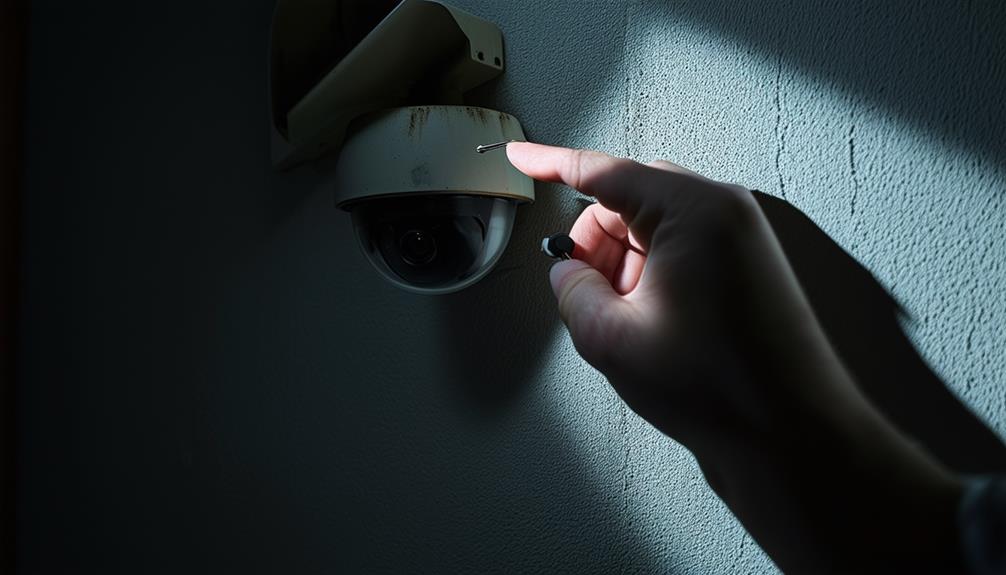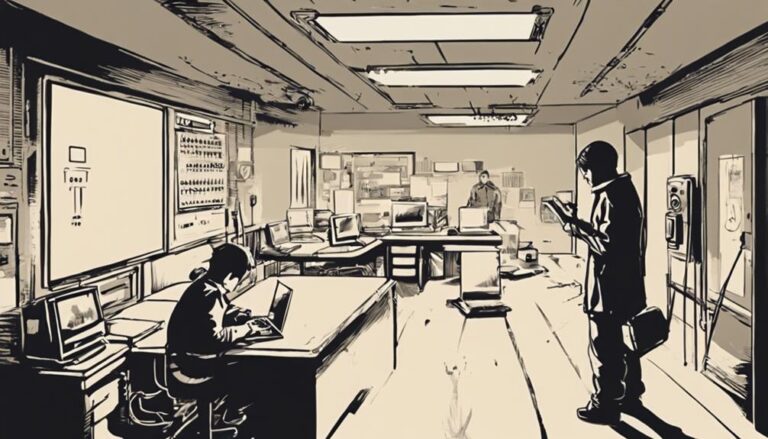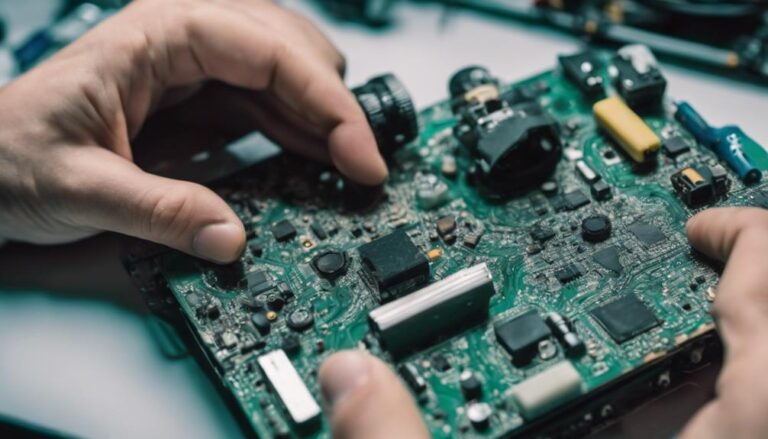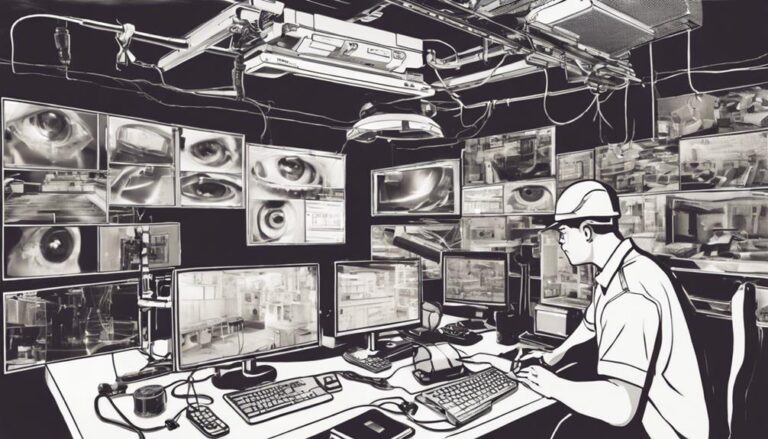To turn off a CCTV camera, you can start by locating its power source. Unplugging the camera from a wall outlet is the simplest method. If it’s hardwired, carefully disconnect the wires, ensuring you don’t draw attention. For networked cameras, unplug the Ethernet cable or disable the Wi-Fi on your router. You can also use camera management apps to pause recording remotely. Be mindful of the legal aspects, as disabling cameras without permission can lead to issues. Exploring other methods can provide you with more options and insights on how to effectively manage your surveillance system.
Understanding CCTV Systems
CCTV systems, or closed-circuit television systems, play an essential role in surveillance and security. They’re designed to monitor specific areas, providing real-time footage that can deter crime and enhance safety. However, these systems can also raise concerns about privacy and personal freedom. It’s vital to understand how they work so you can make informed decisions about your own security and privacy.
CCTV cameras capture video footage, which is transmitted to a specific set of monitors or recording devices. They often operate continuously or can be set to record only when motion is detected. Many systems now offer remote access, allowing users to view footage from anywhere using smartphones or computers. This convenience can be great, but it also means more potential for unwanted surveillance and control over your personal space.
Moreover, the placement of these cameras can greatly impact your sense of freedom. When you know you’re being watched, it can alter your behavior and sense of security. Understanding the technology behind CCTV systems empowers you to navigate a world where surveillance is increasingly common.
Physical Disconnection Methods
When you want to turn off a CCTV camera, the first step is to locate its power source. Once you find it, you can disconnect the video cables to prevent any recording. Finally, disabling the network connection guarantees that the camera won’t transmit any data.
Locate Power Source
To effectively disable a CCTV camera, you’ll need to track down its power source. This is usually where the camera gets its energy to operate, and finding it is essential for your mission. Start by observing the camera’s installation; look for any visible wires or cables leading away from it. They often connect to a power outlet or a junction box nearby.
Once you’ve identified the potential power source, approach it carefully. Depending on the setup, you might find a standard plug connected to a wall outlet or a more complex wiring system. If it’s plugged in, simply unplugging it might be all you need to do. If it’s hardwired, you’ll have to assess the best way to disconnect it without drawing attention.
Disconnect Video Cables
After locating the power source, you’ll need to address the video cables to fully disable the CCTV system. These cables transmit video signals from the cameras to the recording device or monitor, so disconnecting them is vital. Start by identifying the cables connected to each camera. Typically, you’ll find coaxial or twisted pair cables.
Carefully unplug each cable from its respective port. If the cables are secured with screws or clips, use a screwdriver or other tool to release them. Be certain to handle the cables gently to avoid damaging them or the connectors.
Once you’ve disconnected the cables, check to verify that all connections are secure and that no cables are accidentally left attached. This step is essential for maintaining your privacy and regaining your freedom from constant surveillance.
Disable Network Connection
Disabling the network connection is an essential step in guaranteeing complete privacy from CCTV surveillance. When you cut off the network access, you prevent the cameras from transmitting any data, which is vital if you’re seeking freedom from constant monitoring.
To physically disconnect the network, start by locating the Ethernet cable connected to the camera. Unplugging this cable is a straightforward way to sever the connection. If your camera is wireless, you can simply turn off the Wi-Fi on your router or change the network settings to block the camera’s access.
Alternatively, you can also consider removing the camera’s power source to shut it down completely. This will not only disable the network connection but also guarantee that the camera isn’t recording anything at all.
Software and App Solutions
If you’ve ever found yourself needing to temporarily turn off a CCTV camera, software and app solutions can be incredibly helpful. With the right tools, you can gain more control over your surveillance system without the hassle of physical manipulation. Here are some software and app options you might consider:
- Camera Management Apps: Many CCTV systems come with dedicated apps that allow you to control your cameras remotely. You can easily disable or pause recording directly from your smartphone or tablet.
- Custom Firmware: For those tech-savvy individuals, installing custom firmware on your camera can give you advanced control options. This might let you adjust settings to deactivate the camera as needed.
- IP Camera Software: If you’re using IP cameras, various software solutions can help you manage your cameras. Some options allow you to turn off cameras or schedule downtime based on your preferences.
- Network Control Apps: Using network management applications, you can selectively turn off devices on your network, including your CCTV cameras. This is a straightforward way to guarantee your privacy when you need it.
Legal Considerations
When you’re thinking about turning off a CCTV camera, it’s essential to understand the legal landscape surrounding privacy laws and property rights. You might face serious consequences if you tamper with cameras that aren’t yours or violate someone’s privacy. Familiarizing yourself with these legal considerations can save you from potential trouble down the line.
Privacy Laws Overview
Although you may feel a strong need for privacy, it’s crucial to understand the legal landscape surrounding CCTV cameras. Ignoring these laws can lead to serious consequences, and you should know your rights.
Here are four key points to take into account:
- Consent: In many jurisdictions, you need consent from individuals being recorded, especially in private settings.
- Notice: Posting clear signs indicating surveillance can be required to inform people they’re being watched.
- Purpose: CCTV usage should be for legitimate purposes, like security or safety. Using cameras for harassment or snooping is illegal.
- Data Protection: If you collect footage, you may have obligations under data protection laws, including how long you store the footage and who can access it.
Understanding these laws can empower you to navigate the complexities of privacy rights effectively. While you seek freedom, it’s crucial to respect others’ privacy and stay within legal boundaries. Knowledge is your best defense, so familiarize yourself with local regulations regarding CCTV usage. This way, you can assert your rights without inadvertently infringing on the rights of others.
Property Rights Implications
Understanding property rights is essential for anyone considering disabling a CCTV camera, as these rights can greatly impact your actions. Your right to privacy often intersects with the property rights of others, especially when it comes to surveillance systems. If the camera’s on your property, you might have more leeway in deciding whether to disable it. However, if it’s owned by someone else, tampering with it could lead to legal repercussions.
You should also consider the purpose of the camera. If it’s meant for legitimate security, disabling it might not be justifiable. Remember, freedom is best exercised with awareness of the law. Engaging in discussions about surveillance and privacy rights can empower you and others in your community to advocate for changes that promote individual liberties.
Before taking any action, it’s wise to consult legal advice to understand the implications fully. Ignoring property rights can lead to conflicts that undermine your pursuit of freedom. Always weigh your actions against the backdrop of legality and ethics to guarantee you’re not compromising your ideals in the quest for privacy.
Privacy and Ethical Implications
Maneuvering the privacy and ethical implications of turning off CCTV cameras can be complex. While you might feel justified in wanting to disable surveillance, it’s essential to reflect on how your actions impact not just your privacy, but also that of others. Here are four key points to keep in mind:
- Personal Freedom: Turning off a camera can feel like reclaiming your space and autonomy. However, it’s important to weigh whether this freedom infringes on someone else’s right to feel secure.
- Trust and Transparency: If you live or work in an environment where cameras are installed for safety reasons, disabling them without informing others can erode trust. Transparency fosters a sense of community, whereas secrecy can lead to suspicion.
- Legal Consequences: Depending on where you are, tampering with CCTV systems may be illegal. Understanding local laws is essential before evaluating any actions that could lead to legal repercussions.
- Ethical Responsibility: We all share a responsibility to balance personal liberties with collective safety. Reflect on how your choice affects not only yourself but also those around you, including potential victims of crime.
Ultimately, when contemplating the shutdown of CCTV cameras, it’s important to navigate these privacy and ethical waters carefully. You want to advocate for your freedom while also respecting the rights and feelings of others in your community.
Alternative Security Measures
Finding effective security solutions doesn’t have to rely solely on CCTV cameras. There are plenty of alternative measures you can take that respect your privacy and still keep your space secure. One option is investing in motion-sensor lights. These lights can deter intruders simply by illuminating unexpected areas, making it clear that someone’s watching, even if it’s just a light.
Another effective measure is using a good quality alarm system. Modern systems can alert you and local authorities to any breaches, all while being easy to operate. Think about smart alarms that let you control everything from your smartphone. You’ll have peace of mind knowing you can monitor your property from anywhere.
Consider also employing smart locks. They offer an advanced way to secure your home without the hassle of traditional keys. You can grant access to trusted friends or family remotely, ensuring you’re in control. Additionally, neighborhood watch programs can be a great way to foster community safety. When everyone looks out for each other, it creates a protective environment that’s hard to breach.
Lastly, don’t underestimate the power of simple deterrents. A prominently displayed “Beware of Dog” sign or fake security signs can discourage potential intruders. The goal is to create a sense of security that makes your property less appealing to those with ill intentions. By exploring these alternative security measures, you can maintain your freedom while ensuring a safe living space.
Frequently Asked Questions
Can I Turn off a CCTV Camera Remotely?
Yes, you can turn off a CCTV camera remotely, but it depends on the system you’re using. If your camera’s connected to Wi-Fi and has remote access features, you can usually disable it via an app or web portal. Keep in mind that doing so may raise privacy concerns, so it’s important to take into account the implications. Always make sure you’re acting within the law and respecting others’ privacy while enjoying your freedom.
What Tools Do I Need to Disconnect a CCTV Camera?
If you’re looking to disconnect a CCTV camera, you’ll need a few tools to get the ball rolling. Grab a screwdriver set to remove screws, wire cutters to snip through cables, and a flashlight to illuminate your work area. It’s like peeling an onion; each layer reveals another step. Make sure you’re aware of any legal implications before proceeding, ’cause you don’t want to land in hot water for seeking your freedom.
Are There Risks in Tampering With CCTV Systems?
Tampering with CCTV systems carries significant risks. You could face legal consequences, including fines or even jail time, depending on your location and the circumstances. Additionally, you might compromise your own safety or privacy by disrupting security measures in place. It’s crucial to reflect that these systems are often installed for protection, and interfering with them can lead to unintended negative outcomes for you and others. Always weigh the potential repercussions before acting.
How Can I Identify the Camera Brand for Disconnection?
To identify the camera brand for disconnection, look closely at the camera itself. You’ll often find a brand logo or model number printed on the device. Check the user manual if available; it usually contains the brand info. If you’re still unsure, search online using any visible identifiers or take a picture and compare it to images of various brands. This’ll help you pinpoint the right one for your needs.
What Are Common Signs of a Malfunctioning CCTV Camera?
Imagine your CCTV camera as a watchful guardian, suddenly losing its focus. You might notice flickering images or grainy footage, like a dream slipping away. If it’s failing to record or its night vision seems dimmed, that’s a red flag too. You may hear strange noises, akin to whispers of malfunction. If the camera’s not responding to commands, it’s time to set it free from its troubles and consider repairs or replacement.



